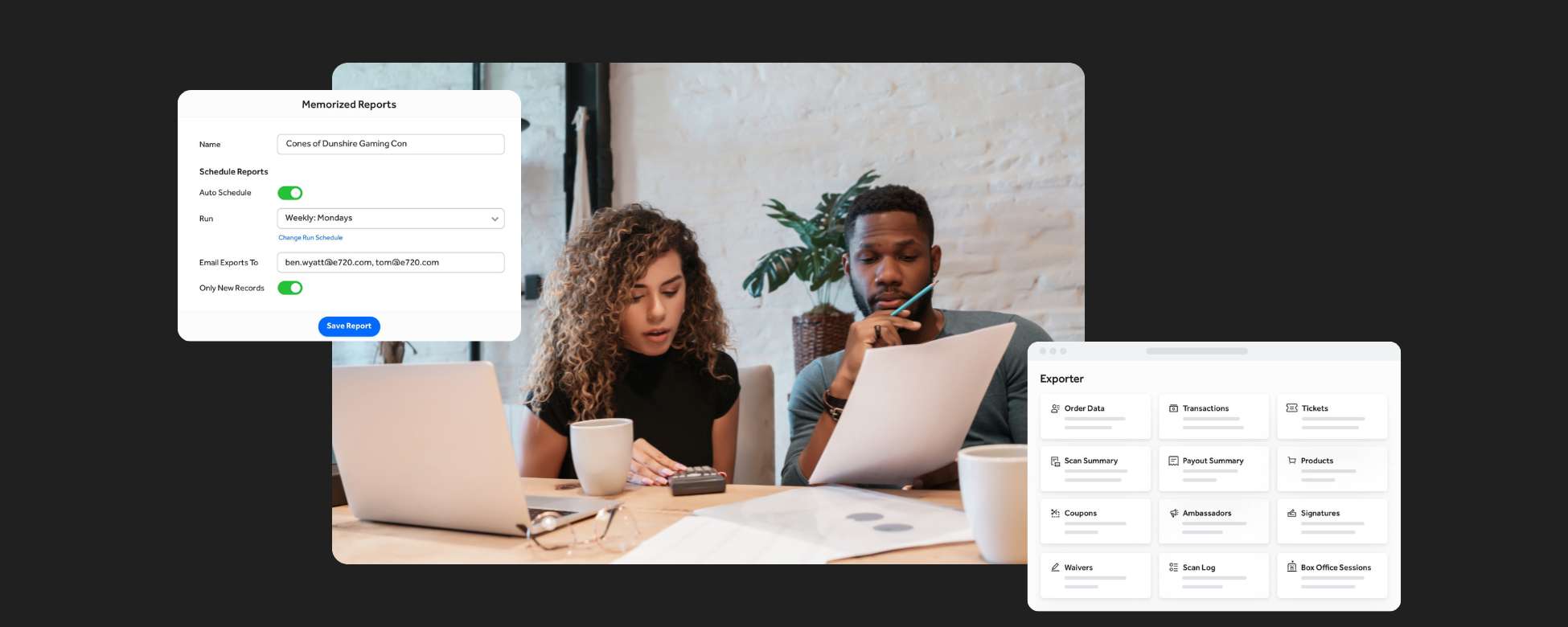The Ultimate Guide to Creating a Budget for an Event
Creating a strategic budget is an essential preliminary step before you hit the ground running with event organizing. Think of your budget as the financial map that helps you navigate the most important aspects of your event’s financial terrain. Analyzing the budget in advance helps you make key decisions, identify unforeseen costs, and pivot if needed. If budget management typically feels tedious and overwhelming, we got you.
The rest of this article will teach you how to create a profitable budget and seamless event experience with ease.
Understanding the Components of an Event Budget
Essentially, event budgets are structured into two main categories: income and expenses.
Income refers to various revenue streams such as ticket sales, VIP packages, sponsorships, and merchandise sales. Any component that contributes to the financial success of your event should be accounted for.
Expenses refer to the costs associated with marketing and executing your event. These can include venue rental fees, catering expenses, decorations, promotion costs, and any other costs specific to your event.
Pro tip: A successful event budget must include room for unforeseen expenses. Allocate a contingency fund to handle the unexpected costs that inevitably arise along the way.
By gaining a clearer understanding of the inflow and outflow of your money, you can unintentionally allocate your resources and plan your event accordingly.
Steps to Create a Budget for Your Event
To plan your event budget, get started by following these simple steps.
- Set financial objectives for your event - Whether you’re shooting to raise a certain amount of funds or to keep expenses below a specific number, identify some measurable goals for your event. Clearly defined financial objectives will help guide your future budgeting decisions
- Determine both fixed and variable costs - Diligently detail all anticipated expenses from the early marketing campaign to technology that powers the last song of the event. As you list out the expenses, prioritize them based on importance so you can allocate funds accordingly.
- List your sources of revenue - Estimate the amount of income you’ll bring in from ticket sales, VIP packages, sponsorships, and merchandise sales. While you want to aim for realistic projections, anticipate that some of these numbers will change.
- Review and track your event budget - Even with the most meticulous planning, your budget might change as you go. Regularly review your budget and stay flexible if you need to adjust or accommodate any changes. This level of attention to detail will create a budget that sets your event up for financial success.
- Analyze the financial performance of your event - The insights you gain from this year’s event will help inform your decisions for next year’s event, but there’s no need to swim in spreadsheet confusion. Use the TicketSpice exporting feature to review sales and payout summary, and the analytics feature to analyze sales, refunds, and conversions.
Tips for Effective Event Budgeting
Below are five tips that will make your event budgeting more effective.
Start early - Effective event budgeting starts well before the event to allow ample time for thorough planning and adjustments.
Be realistic - Base your projections on reliable data, research, and market trends to avoid overestimating income or underestimating expenses.
Track constantly - Meticulously track all expenses to ensure nothing falls through the cracks. Use the TicketSpice reporting feature or a spreadsheet to stay organized.
Consider additional revenue - Explore alternative revenue streams beyond ticket sales. Sponsorships and merchandise, for example, can be a great way to diversify your income sources.
Negotiate for discounts - Vendors can significantly impact your bottom line, so don't hesitate to negotiate with them. Be transparent in your communication and seek a win-win situation.
Ultimately, effective budgeting is a skill that requires a combination of foresight, organization, and adaptability.
Allocating Funds for Different Aspects of the Event
When it comes to allocating funds for different aspects of your event, your goal is to kick off a working document, so keep it flexible enough to change. Begin by assessing the specific needs and objectives of your event, considering factors like size, type, and goals. You’ll likely need to allocate a significant portion of your budget to venue rental, catering, and marketing, but don't overlook opportunities for cost-saving in these areas. For example, maybe you could opt for a slightly smaller venue with excellent amenities to save costs without compromising on quality.
To allocate the appropriate amount of funds, break down the categories into percentages or fixed costs. For example, you can allocate $7000 or 25% of your total event budget for your venue of choice. Start with the most costly categories and work your way into the less expensive parts of the event.
Pro tip: Budgeting is a lot easier when you start from a template. Check out HubSpot to download a budget template and choose one that best fits your event needs.
Common Budgeting Mistakes to Avoid
Want to ensure the success of your event? Avoid these common mistakes.
Neglecting a Contingency Fund
In event planning, it’s not uncommon to stumble upon unexpected costs. A surprise thunderstorm on the evening of the concert requires an expensive tent installation, or the corkage fee at the festival turns out to be enormous. Even when everything runs smoothly, permits, insurance, and transportation fees can rack up expenses in a hurry.
Don’t let unexpected fees or accumulated small costs sideline your event budget. If you set aside three to 10% of the total event cost as a buffer, you won’t regret it.
Skipping Negotiation
If you book the first vendor, venue, or service provider you talk to, it’s unlikely you’ve found a great deal. Don’t hesitate to shop around, do some research, ask for discounts, and negotiate the best terms for your event. Negotiation isn’t about being cheap; it’s about being savvy and finding a win-win situation for your event budget and the service provider.
Failing to Communicate with Stakeholders
Sponsors and stakeholders play a significant role in the financial success of your event, and consistent communication is crucial. Failing to communicate can result in mismatched expectations, decreased support, and missed opportunities. Don’t jeopardize the success of your event by leaving your stakeholders in the dark. Establish a clear communication schedule early on and stick to it.
No Purchase Protection
As an event organizer, chargebacks can drain your bank account and leave a demoralizing dark cloud over your day. The good news is that chargebacks are preventable. The best way to slash them is to offer a Purchase Protection upgrade at checkout. With TicketSpice Purchase Protection, attendees can pay a small fee to secure a refund in the case an unexpected event stops them from attending the main event. The cool part is, if a customer uses Purchase Protection, our system allows you to sell the ticket twice, and you make double!
Waiting Too Long for Payouts
If you’ve grown accustomed to waiting days after your event for a payout—as the bills pile up and accrue interest in the meantime—it’s time to reevaluate your ticketing software. Your event revenue belongs to you, and delayed payouts are a surefire budget blunder. With TicketSpice, you’ll get the regular payouts you deserve in the lead-up to your event.
Not Charging Enough For Tickets
These days, the price of just about everything is rising—including the cost of running your event. If you run the numbers over and over, and find they don’t add up to anything profitable, consider adjusting your ticket prices.
Tools and Resources for Event Budgeting
From the invoices and reports to negotiations, event budgeting involves juggling multiple moving parts. Depending on your tools, the budgeting process can either flow efficiently or make you want to pull your hair out. We recommend using your favorite project or budget management software to track time, expenses and tasks and then integrating it with the TicketSpice platform.
Additionally, the TicketSpice reporting feature gives you instant visibility into tickets sold, fees collected, remaining inventory, total revenue, refunds, and breakouts of add-ons and upgrades.
Final Takeaways
Creating a budget for your event is not just about crunching numbers; it's about laying the groundwork for a successful and financially sound experience. By understanding the components of an event budget, following a structured approach to planning, and avoiding common pitfalls, you can ensure that your event stays on track financially and delivers a memorable experience for attendees.
If you have any questions, don’t hesitate to reach out to our support team.
We’re here to help you have the best event ever!
— The TicketSpice team






















.png)
